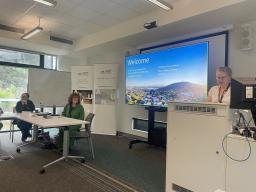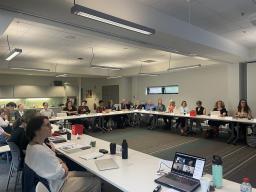
Participants to Workshop, photo courtesy M.Staff
On 28 March 2025, during Women’s History Month, a one-day workshop on ‘The Privilege of Trailblazing’ was held, with support from the ANU Gender Institute. Organised by Dr Karen Fox, Professor Kim Rubenstein, and Dr Michelle Staff, the workshop aimed to critically investigate the concept of trailblazing.
Researchers have long been interested in women who were among the first to achieve particular milestones. Contemporary feminist praxis, especially the emphasis on intersectionality, decolonisation, and issues of privilege, require that these ‘firsts’ be approached in more critical ways. Bringing together historians and scholars from other disciplines, whose work ranged across Australian and Pacific histories, the event richly achieved these aims, as presenters spoke to pre-circulated draft papers on a broad spectrum of topics.
Across four engaging sessions, around 30 contributors and participants considered complex issues raised by thinking about trailblazing in several diverse contexts:
- The Professions: Breaking Through Gendered Boundaries;
- Women’s Work: Traditionally Feminine Realms;
- Beyond the ‘Typical’ Trailblazer: Indigeneity, Colonialism, Migration, Class, and Religion;
- Remember and Forgetting: Trailblazers and Their Legacies.
ANU researchers who participated in the event included staff and students from both CASS and CAP, among them PhD candidates Ruby Ekkel, who discussed the bushwalker and feminist Marie Byles, and Madeline Pentland, who considered on Natasha Stott Despoja’s career as a dual trailblazer as the ‘youngest woman’ parliamentarian.
Rich and enlivening discussion followed all the sessions, which were expertly chaired by Gender Institute members Professor Frank Bongiorno, Dr Meaghan McEvoy, Professor Margaret Jolly, and Dr Karen Downing. The convenors look forward to continuing to work with the contributors to prepare an edited collection arising from the day.
Core questions that shaped the conversation included what enables trailblazing? Who is a trailblazer? What does trailblazing look like in colonial contexts? How and why do we remember (or forget) trailblazers? And is trailblazing a useful concept? Many papers considered the personal and structural conditions that allowed the women of their case studies to achieve as they did, exploring issues of privilege in the process. Others prompted us to ask what we mean by ‘trailblazing’ – or indeed by ‘privilege’ – and whether and how that term helps us to understand women’s achievements in breaking boundaries or expanding women’s lives and experiences. A particularly interesting question that resonated throughout the day was the relationship between being ‘first’ and being a changemaker, and what it means to celebrate an individual as a trailblazer. These important questions continue to be relevant in the twenty-first century, when the terminology of ‘trailblazing’ is widely embraced.
The convenors are sincerely grateful to the ANU Gender Institute for their generous support of this event.

